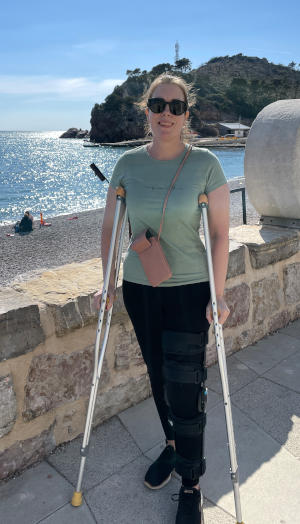Don't turn your broken leg into a broken heart. Living on crutches is tough enough without adding relationship troubles as well. While I didn't have a live-in partner when I was confined to my apartment, I did talk to a few others about what they learned from having their partner as a caregiver.
It's a shock to you to be on crutches and confined to your apartment, but don't forget it's also a huge challenge for your partner. They're used to having you mobile and happy, and now you're probably not that pleasant to be around while you're immobile, grumpy and in pain. It's also really tough to see someone you love in pain and not be able to do anything about it.
It may not be a natural transition for them either; not everyone excels in a caring profession.
So to keep from you ended up in the divorce courts or spending a lot more tie by yourself than you anticipated, here are a few tips to help you have more patience and compassion for each other.
Try setting a schedule for agreed times when you carer can check up you. This frees them from constant interruptions and feeling like they are at your beck and call for water, snacks - everything you can't do for yourself.
You could either make it something simple like at the top of the hour - one o'clock, two o'clock, etc - they come and check on you. Or if you need it more or less often, set a timer on the phone for 45 minutes or two hours. This way your carer is freed from clock watching and having to worry about you until the timer goes off.
Obviously, if there is an emergency, you don't need to stick to the schedule, but the overall idea is to let your carer have some time where they AREN'T having to think about you and your needs. And the more time they have to themselves, the less chance they are going to burn out.
Communication is so important for both of you. When you're in pain or feeling frustrated or confined, you're not at your best - and that affects the people around you, and especially your caregiver. Tell your partner that you understand that they didn't ask for this either, and you're sorry if you seem short sometimes.
Ask them how they feel about the situation you're both in, and how YOU can make it easier for them. It's too easy to fall into self-pity and that you're in pain and nothing in the world exists outside of that. But by simply asking them how they feel - and listening - can help your partner feel heard and help diffuse any resentment that might be building.
It's very easy to become dependent on your partner for as your sole source for conversation, company, and entertainment. To reduce the pressure on them to be your sole source of amusement, now is the time to schedule some Facetime, Zoom or regular phone calls.
It gives you a window to the outside world, a new person to vent to, and a welcome break from the monotony of your four walls. Plus, having calls in your calendar gives you something to look forward to.
IMPORTANT: Avoid only talking about your injury. Health issues are fascinating to the one experiencing them and deadly boring to everyone else. Keep your calls positive by starting the conversation with something like, 'Hey, I'd really like to talk about something other than my leg. What's the best thing you did this week, or, what's going great in your life?
You might be confined inside four walls or even to your bed, but you still time and the Internet. Spend a little time thinking about something your partner might like and order it in for them. Flowers, their favourite meal, a surprise gift - anything that might brighten their day.
Good luck in your recovery, and your relationship! I really hope these tips help you both make it through the challenging months on crutches. If you want to find out how to heal your fracture as fast as possible, check out the 6 Step Tibia Healing Guide.
Hi, I'm Kate Hill. I had a skiing accident and smashed by tibial plateau in a dozen pieces, leading to major surgery and then months on crutches.
I spent that time researching EVERYTHING about my injury and recovery, and was back on my feet walking again in almost record time.
I've put it all together in a guide called The 6 Steps to Faster Tibia Healing - so you don't have to go through what I went through.

© 2024 Best Broken Leg Ever & Kate Hill · All Rights Reserved · Privacy Policy · Terms & Conditions